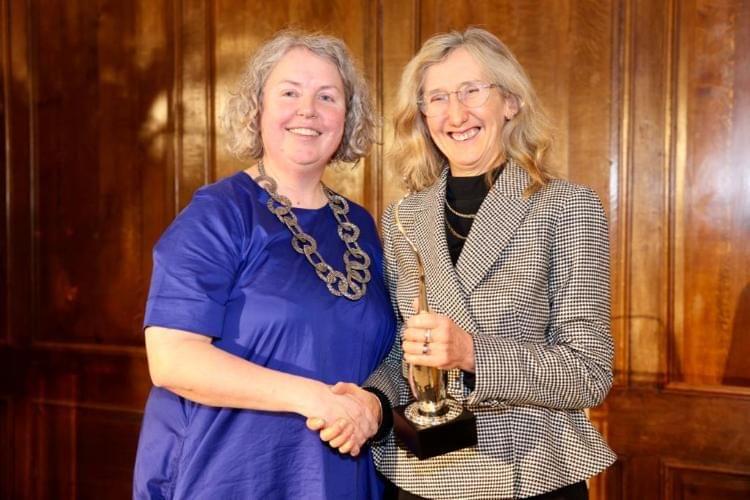Professor Orla Hardiman received this year’s Provost’s Innovation Award for her research regarding Motor Neuron Disease.
Hardiman and 15 other researchers and inventors of Trinity were honoured at the Trinity Innovation Awards, which took place on November 7 in the Old Dining Hall.
Speaking at the ceremony, Provost Linda Doyle said: “I want to congratulate all the recipients of this year’s Trinity Innovation Awards. Innovation in Trinity has its roots in rigorous academic research and it is striking to see such a wide range of disciplines – from history to zoology – represented among this year’s winners.”
She continued: “These innovations are addressing a wide range of issues such as the need for more reliable broadband, a diagnosis for Parkinson’s disease and a better understanding of ageing in people with intellectual disabilities.”
Besides her research and practice in the causes, treatment, and diagnosis of Motor Neuron Disease, Hardiman co-founded TRICALS, a European research initiative that aims to find a cure for the disease.
The initiative unites 48 research centres from 16 different nations. The provost described Hardiman as having “an outstanding record of clinical and academic achievement, coupled with significant international and interdisciplinary collaborations”.
She added: “As the HSE’s National Clinical Lead for Neurology, as a consultant neurologist at Beaumont Hospital and as Trinity’s first Professor of Neurology, she strives to improve the lives of people living with Motor Neuron Disease by developing highly innovative approaches in her research and in her collaborative partnerships.”
Awards were also given in the categories Lifetime Achievement, Campus Company Founders, Inventors, Ones to Watch, Societal Impact, Industry Engagement, and Consultancy.
Werner Blau was the recipient of the Lifetime Achievement Award. Currently Emeritus Fellow of the School of Physics, Blau has been researching nanoscience in Trinity since 1983. His work on the interaction of carbon nanotubes with polymers has led to patented technology licensed by US companies.
Professors Conor McGinn and Gerard Boyle were awarded in the category Campus Company Founders, while Marco Ruffini and Ed Lavelle were honoured as Inventors.
Mary McCarron and Peter Crooks were recognised for their societal impact, as well as Ann-Marie Healy, Nessa McEniff and Ann Devitt for consultancy.
Jacintha O’Sullivan and Stephen Dooley received the Industry Engagement Awards.
Further, Lewys Jones, Ian Donohue, and Triona Lally were noted as Ones to Watch, indicating good prospects of receiving an award in another category in following years.
Director of Trinity’s Research and Innovation Unit Leonard Hobbs added: “We are delighted to again recognise the inspiring work of our colleagues who consistently translate their excellence in research into impactful innovations, providing solutions across a broad range of areas such as health, heritage, communications, robotics and materials.”
“We also welcome this year’s campus company founders who continue to exploit Trinity’s deep tech capabilities in launching investable spin-outs.”
Four new “campus companies” were also announced during the evening.
These include Altach Biomedical, which focuses on cartilage repair and the treatment of mild to moderate osteoarthritis, and Starling Surgical, who provide a disposable wound closing device.
Swan, which develops AI-driven body scanning technology, and VoiceTune, a cloud-based Text-to-Speech AI platform generating expressive speech, also received the recognition.
The Trinity Innovation Awards are given annually and take the form of research funding. The Provost’s Innovation Award was first introduced in 2005, with other Innovation Awards added in later years.






